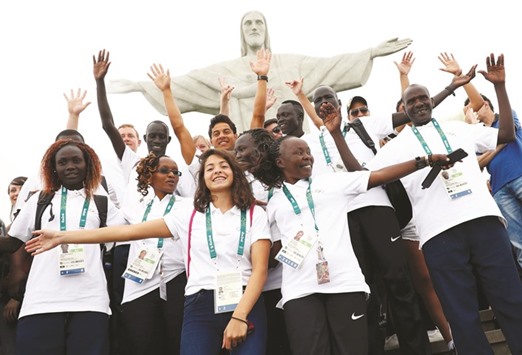If bravery was an Olympic sport, the 10 athletes who make up the first-ever refugee team in Rio would be odds-on for a clean sweep of the gold medals.
From Yusra Mardini, a teenage swimmer from Syria who braved a Mediterranean crossing in a leaky dinghy, to Popole Misenga, who spent eight days hiding in a forest as a terrified child to flee bloody fighting, each of the refugee athletes have overcome daunting odds to maintain their Olympic dreams.
Mardini, 18, spoke of her delight yesterday at the prospect of participating in Rio, where she will compete in the 100 meters butterfly and 100m freestyle. “It’s absolutely an honour for me to be here,” Mardini told a press conference.
Less than a year ago, Mardini was swimming for her life. During a perilous journey to Lesbos, the engine of their packed dinghy failed and the craft began taking on water. Mardini and her sister jumped into the water, grabbed a rope and and spent the next three-and-a half-hours in the choppy water towing the boat to safety.
Mardini, who has now settled in Germany with her family as a refugee, says she will proudly represent Syria, the Olympic movement and her recently adopted homeland when she competes in Brazil. “It’s for my country, for Germany and the Olympic Committee, because they gave me all the support to make it possible,” Mardini said.
Mardini is joined in the refugee ranks by another Syrian swimmer, Rami Anis. Anis fled Syria in 2011 to avoid being enlisted into the army, relocating to Belgium from Istanbul in October last year.
“I’m very proud to be here,” Rami said. “But I feel a bit of sadness that I’m not participating as a Syrian. We are representing people who have lost their human rights and are facing injustices.”
The 25-year-old butterfly and freestyle swimmer described the refugee team as a group that “does not despair”.
“We have iron wills. We feel sad of course because of the wars in our countries,” Anis said.
For Congelese judoka Misenga, recalling the devastating toll that conflict has had on his family was too much. The 24-year-old broke down in tears when he was asked to comment on what message he hoped to send through his Olympic participation.
Misenga was just nine years old when he fled fighting in Kisangani in the Democratic Republic of Congo. Separated from his family, he hid in the jungle for eight days before being rescued and taken to a centre for displaced children in Kinshasa. He later settled in Brazil, staying in the country after the 2013 World Championships.
“I have two brothers that I haven’t seen for years. I don’t remember their faces,” Misenga said tearfully. “I want to send them hugs and kisses. I’m here in Brazil participating so that one day I can bring them to live with me here in Brazil.”
“I can hardly believe I’m here with so many people listening to us. When I think of those things all those years ago I feel sad. I haven’t seen my family for 18 years... If you can see me on TV now I am alive and well and striving so that one day I can get a ticket for you to come here and live with me,” he added, his voice quivering as he wiped away the tears.
Misenga was introduced to judo in Brazil and quickly progressed to a level where he was selected to represent the DRC at the world championships in Brazil.
Once in Rio de Janeiro, however, he was abandoned without money or papers by his coach and, along with teammate and fellow Refugee Team member Yoland Mabika, fled to the streets.
“I had two difficult years in Brazil. I didn’t have anything to eat, I didn’t have papers, I spoke only French and I went to the street to get food,” he said.
Eventually, with help from a refugee centre, he was given asylum and returned to judo. He was then taken on as part of the IOC’s Refugee Team and, speaking confident Portuguese, said he intended to grasp the opportunity.
“I am not sad that I cannot carry the flag of my country because I represent refugees around the world and so I am competing under the flag of all their countries,” he said. “Sport has transformed my life. Through judo I’ve learned respect, discipline and focus. But this is not just a struggle for sport, it is a struggle for life.”
Misenga has been training under former Brazil national team coach Geraldo Bernardes, a veteran of four Olympics in a sport topped by only volleyball and sailing in terms of medals won by the country.
“I’ve helped people win many medals at the Olympics so I was very happy to help,” he said. “He was abandoned, there was nobody there for him, but for him and others like him sport has helped him develop as a person; to become confident, become a part of society. He is competing for a medal here but his gold medal is humanity.”

Members of the Olympic refugee team pose for a group photo in Rio. (Reuters)
